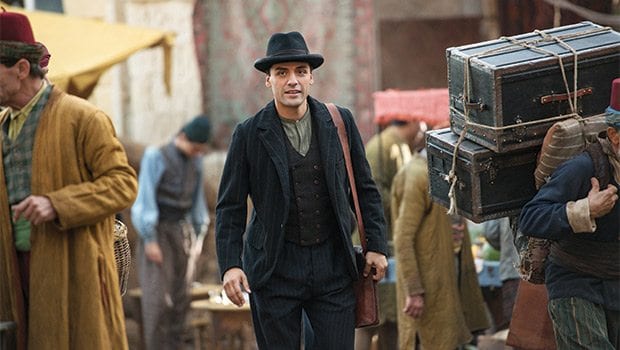WWI saga revolves around love triangle in the midst of ethnic cleansing

It’s Eastern Turkey in 1914, which is where we find druggist Mikael Boghosian (Oscar Isaac) plying his trade in his half-Armenian/half-Turkish village where Christians and Muslims get along swell. The ambitious young apothecary would really rather be a doctor, so he strategically courts a neighbor (Angela Sarafyan) from a relatively-wealthy family just for the dowry.
At a glance
“The Promise”
The verdict: Excellent (3.5 stars)
Rated: PG-13 for mature themes, sexuality, violence, disturbing images and war atrocities
Running time: 134 minutes
Production studio: Survival Pictures
Distributor: Open Road Films
To see a trailer for “The Promise,” visit: www.youtube.com/watch?v=zwut1DUXaZc
Those 400 gold coins do enable him to afford med school. However, while studying in Constantinople, he falls head-over-heels for Ana (Charlotte Le Bon), a fellow Armenian recently repatriated from France. The country bumpkin is taken not only with her pulchritude but with her urbane sophistication ostensibly cultivated over the course of a childhood spent in Paris. Trouble is, Ana has returned accompanied by her lover, Chris Meyers (Christian Bale), an intrepid American photojournalist assigned by the Associated Press to find evidence of ethnic cleansing.
The plot thickens when World War I erupts. Instead of pursuing Ana and his M.D., Mikael finds himself fleeing the roundup of innocent Armenian civilians by the Turkish army. He makes his way back to his tiny hometown to rescue relatives and friends. Meanwhile, Ana is in a similar struggle to survive, and her beau does his best to shoot proof of the savage slaughter rumored to be transpiring.
Theatrical heroism
That is the dire set of circumstances established at the outset of “The Promise,” a riveting docudrama directed and co-written by Oscar-winner Terry George (“The Short”). The edge-of-your-seat thriller bears an uncanny resemblance to “Hotel Rwanda,” which George directed and co-wrote, too.
Both of these films chronicle extraordinary exhibitions of heroism in the face of a complete collapse of civilization. If this picture has a flaw, it’s that it appears to be trivializing the ethnic cleansing of one and a half million Armenians when it asks that holocaust to serve as a mere backdrop to the love story at the center of the saga.
That being said, I nevertheless invested in the characters emotionally, and ended up teary-eyed during the denouement. War may be hell, but luckily, love still conquers all.






